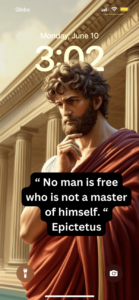In letters from a stoic 45, Seneca begins by reminding Lucilius that when reading books, quality is more important than quantity. It is better to have a few beneficial books rather than a massive collection of random books.
In the next part of the letter, Seneca reminds his friend to take every work the wise old man gave with a grain of salt. “But whatever the quality of my works may be, read them as if I were still seeking, and were not aware of, the truth, and were seeking it obstinately, too.” Even the man who’s considered one of the greatest writers in the Ancient World asks the relatively younger man to evaluate his work.
Nevertheless, it is a typical stoic rationalist attitude that can be found in a lot of Seneca’s work. For example, in letter 33, he told Lucilius to scrutinize all the works of the greatest philosophers that he would come across stating that these sages are “not their master but only guides” and therefore take truth only for himself. In that letter, he told Lucilius that a wise man should be able to write his own aphorism or maxims and simply not copy from other great philosophers.
Seneca then addresses flattery around friendship. “How closely flattery resembles friendship! It not only apes friendship, but outdoes it, passing it in the race; with wide-open and indulgent ears it is welcomed and sinks to the depths of the heart, and it is pleasing precisely wherein it does harm” Basically, he means that any friendship built around flattery is fake and therefore dangerous. In letter 3, Seneca discussed quite a bit about what constitutes genuine friendship.
Next, Seneca discusses what makes a happy man. “At any rate, if you wish to sift doubtful meanings of this kind, teach us that the happy man is not he whom the crowd deems happy, namely, he into whose coffers mighty sums have flowed, but he whose possessions are all in his soul, who is upright and exalted… “ There are succeeding lines after this but all of which boils down to the fundamental Stoic teaching that a man becomes only be genuinely happy if he focuses on what he can control – his soul. Externals things granted by Fortune are not reliable because they are fleeting.
In the last part of the letter, Seneca talks briefly about the harm of accumulating things that are not necessary. “It clear to all men that the search for the superfluous means a great outlay of time, and that many have gone through life merely accumulating the instruments of life… ‘What harm is there in this,’ you ask? Infinite harm; for such persons do not live, but are preparing to live. They postpone everything. Even if we paid strict attention, life would soon get ahead of us; “
The Stoics have always said the only thing that’s worth pursuing is virtue which the Stoics defined as the absolute good. We are wasting a chunk of our time chasing anything beyond virtue (i.e. wealth, fame, power) because those things are limitless and fleeting. Virtue can be accessed anytime with nothing but our will.
***** Letters from a Stoic Key Takeaways is a collection of short key takeaways from the letters sent by Seneca to Lucilius. Read each letter’s key takeways here .






